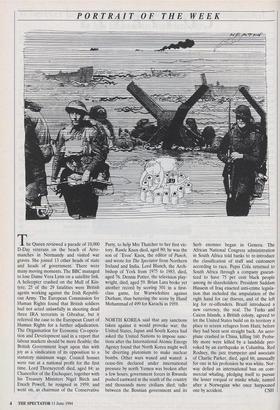PORTRAIT OF THE WEEK
he Queen reviewed a parade of 10,000 D-Day veterans on the beach of Arro- manches in Normandy and visited war graves. She joined 13 other heads of state and heads of government. There were many moving moments. The BBC managed to lose Dame Vera Lynn on a satellite link. A helicopter crashed on the Mull of Kin- tyre; 25 of the 29 fatalities were British agents working against the Irish Republi- can Army. The European Commission for Human Rights found that British soldiers had not acted unlawfully in shooting dead three IRA terrorists in Gibraltar, but it referred the case to the European Court of Human Rights for a further adjudication. The Organisation for Economic Co-opera- tion and Development said in a report that labour markets should be more flexible; the British Government leapt upon this with joy as a vindication of its opposition to a statutory minimum wage. Council houses were run at a national profit for the first time. Lord Thorneycroft died, aged 84; as Chancellor of the Exchequer, together with his Treasury Ministers Nigel Birch and Enoch Powell, he resigned in 1959, and went on, as chairman of the Conservative
Party, to help Mrs Thatcher to her first vic- tory. Rawle Knox died, aged 80; he was the son of Evoe' Knox, the editor of Punch, and wrote for The Spectator from Northern Ireland and India. Lord Blanch, the Arch- bishop of York from 1975 to 1983, died, aged 76. Dennis Potter, the television play- wright, died, aged 59. Brian Lara broke yet another record by scoring 501 in a first- class game, for Warwickshire against Durham, thus bettering the score by Hanif Mohammad of 499 for Karachi in 1959.
NORTH KOREA said that any sanctions taken against it would provoke war; the United States, Japan and South Korea had asked the United Nations to impose sanc- tions after the International Atomic Energy Agency found that North Korea might well be diverting plutonium to make nuclear bombs. Other wars waxed and waned: a cease-fire declared under international pressure by north Yemen was broken after a few hours; government forces in Rwanda pushed eastward in the south of the country and thousands more civilians died; talks between the Bosnian government and its Serb enemies began in Geneva. The African National Congress administration in South Africa told banks to re-introduce the classification of staff and customers according to race. Pepsi Cola returned to South Africa through a company guaran- teed to have 75 per cent black people among its shareholders. President Saddam Hussein of Iraq enacted anti-crime legisla- tion that included the amputation of the right hand for car thieves, and of the left leg for re-offenders. Brazil introduced a new currency, the real. The Turks and Caicos Islands, a British colony, agreed to let the United States build on its territory a place to screen refugees from Haiti; before they had been sent straight back. An aero- plane crashed in China, killing 160. Proba- bly more were killed by a landslide pro- voked by an earthquake in Columbia. Red Rodney, the jazz trumpeter and associate of Charlie Parker, died, aged 66; unusually for one in his profession he was white. Nor- way defied an international ban on com- mercial whaling, pledging itself to pursue the lesser rorqual or minke whale, named after a Norwegian who once harpooned


































































 Previous page
Previous page